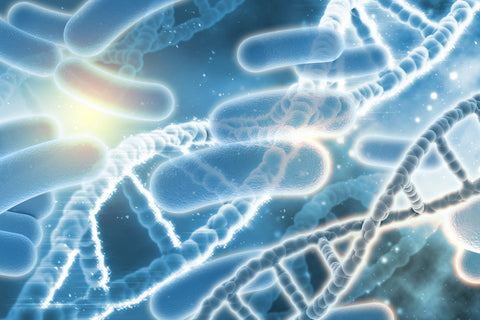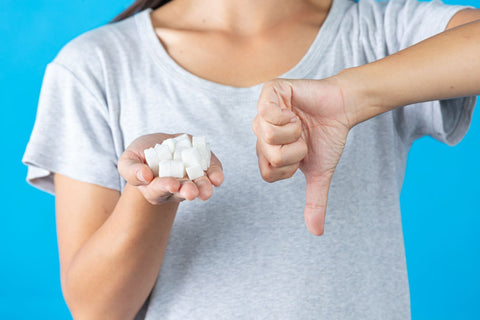Candidiasis, also called yeast infection or thrush, is a fungal infection caused by the bacteria Candida species, of which Candida albicans is the most common. Candida albicans is a type of yeast that lives in our bodies (in the mouth, intestinal tract, and vagina).
Normally, candida causes no harm if we are equipped with enough probiotic (friendly) bacteria and a strong immune system with plenty of white blood cells, we are able to keep candida under control.
Unfortunately, antibiotics, some medications, high-sugar diets, weak immunity, stress, zinc deficiency, vitamin D deficiency, allergies, and accumulation of heavy metals such as mercury and lead.
And many other factors can cause the friendly bacteria to die, leaving candida free to grow unchecked, causing many different symptoms. Polycystic ovary syndrome (PCOS) increases your chances of developing a yeast infection.
Symptoms of a Yeast Infection
Symptoms include fatigue, bad breath, a white coat on the tongue, oral thrush, headaches, thrush, vaginal infections, fogginess in the morning, when waking (brain fog), digestive complaints, and joint pain.
Furthermore, skin problems, loss of sex drive, mood disorders, recurring vaginal and urinary tract infections, sinus infections and hormonal imbalance, etc.
Thrush is marked by soft white patches in the oral cavity, around the anus, or on the skin. It most often appears as a result of a seriously weakened immune system due to a high-sugar diet, antibiotics, or undergoing chemotherapy.
A vaginal yeast infection, by far the most common form of candida, causes burning, itching, and soreness in the vagina, along with a thick, sticky discharge. It’s often the result of antibiotic use, poor diet, hormone level imbalance, or a combination of these causes.
Candida can even pass the bowel wall, passing into the bloodstream and through the body. Once this happens, it can cause depression, extreme fatigue, and a ‘hung over’ feeling in the morning.
Occasionally the candida spreads throughout the entire body causing a condition known as systemic candidiasis, producing a wide variety of symptoms.
If you feel sick but are told that nothing is wrong or have a menstrual cycle with irregular periods with no apparent explanation there’s a good chance that you’re suffering from systemic candidiasis.
Causes
- Diet high in sugar, cheese, pizza, refined products, junk food, dairy, and meat products (contaminated with antibiotics).
It is believed that to grow, Candida generally causes a craving for certain foods that feed it such as sugar, white flour products, yeast, and pasteurised cow’s milk products.
- Prolonged or frequent use of antibiotics or corticosteroids that kill beneficial probiotic bacteria in the gut is one of the most common causes of Candida overgrowth and thrush.
- Oral contraceptives (birth control pills) imbalance the gut in the same way as antibiotics, giving Candida an open door to take control.
- Adrenal misfunction and diabetes have also been suggested as factors which encourage candidiasis.
- Also, poor digestion, weak immune system, stress, hormonal imbalance (levels of estrogen affected by thyroid hormones and sex hormones), toxins, nutritional deficiencies, and some other factors may contribute to the overgrowth of candida.
Effective Ways to Keep Candida Under Control
- Go on a Candida diet! one of the obvious steps is to eliminate or cut down on sugars, alcohol, and all refined carbohydrates such as white bread, white rice, pasta, cakes, and biscuits, as they feed candida.
- Address leaky gut syndrome, because intestinal permeability is believed to be a root problem of chronic and systemic candida.
- If you want to fight candida effectively, do your best to promote the growth of friendly bacteria that live in the digestive tract.
These probiotic bacteria are essential for maintaining a strong immune system that keeps yeast levels in check.
- Try to manage stress as chronic stress can alter flora balance and can suppress immune function.
- If possible, try to avoid birth control pills or other forms of synthetic hormones as they may lead to candida overgrowth.
Instead, you can use natural contraceptives that are beneficial in fighting candida. The best natural contraceptive is Neem oil.
- Try to avoid over-ripe fruit, dried fruit, bananas, melon, or grapes because they contain too much sugar. Fresh fruits may be eaten but in moderation.
- No fruit juices, honey, or artificial sweeteners. Stevia and Xylitol (which prevents candida infections) are safe alternatives.
- Avoid food additives and processed food.
- Avoid or at least reduce consumption of cow’s milk and dairy products (especially cheese), including butter.
- Avoid all alcohol and refined or heated oils as they weaken the immune system. If you must fry your food use coconut oil and avoid overheating.
- Consume 1-2 tablespoons of ground flaxseed daily as it has antifungal properties.
- Try to include the following foods in your diet: Garlic, onions, leek, onion, raw cabbage, raw broccoli, fresh raw vegetables, raw vegetable juices, sprouts, and raw coconut oil.
Moreover, beans, lentils, plant-based yoghurts, homemade sauerkraut, and miso.
Supplements and Herbs
- Take supplements such as Sacardi (with Saccharomyces boulardii) or FemProbio as they contain live probiotic bacteria that have proved to fight Candida and prevent its overgrowth.
- Grapefruit seed extract (200mg two or three times, daily). Practitioners rely on this herb for its anti-candida properties.
- According to Dr Axe, Pau D'Arco fights Candida
- Zinc and stomach acid deficiency can also contribute to the overgrowth of candida. Certain men experienced symptoms of severe candida overgrowth and discovered it was mostly caused by a lack of zinc and low stomach acid.
Taking zinc with hydrochloric acid tabs, for a month fixed the problem.
Without zinc, it is difficult for the stomach to produce enough acid. On the other hand, without the acid, the body can’t absorb the zinc.
Once they started taking zinc and improved acid production in the stomach, they could stop taking the hydrochloric acid and continue with the zinc. The candida problem disappeared permanently.
To avoid nausea as a result of taking zinc supplements try zinc citrate (30-50mg) after meals.
- Chlorella and Spirulina have been shown to encourage and support the growth of healthy bacteria in your gut, which can help keep candida overgrowth under control.
- If possible, consume raw garlic, daily, or to avoid the unpleasant smell, take good quality standardised garlic supplements such as Garlic Max, as allicin (the main component of garlic) also helps fight candida and fungal infections.
Please keep in mind that many garlic products such as odourless garlic, powders, or oils won’t be effective. Effective garlic supplements must be standardised for the presence of allicin.
- According to some studies Bee Propolis, like garlic, also helps to fight candida.
- Take SuperGreens such as Chlorella, Spirulina, Moringa, or Alfalfa which are known to support detoxification and increase the number of good probiotic bacteria, that help reduce the amount of candida in the gut.
- Evening Primrose Oil or Starflower Oil (two times higher in gamma-linolenic acid than Evening Primrose Oil) are known to help fight candida overgrowth and are even more effective when combined with Pau d’Arco.
- Caprylic acid supplements have been shown to have antifungal properties. The best food source of this acid is raw organic Coconut oil.
External Applications
- Mix 4 drops of Tea Tree essential oil with 1 or 2 teaspoons of raw organic Coconut oil (or Neem oil) and use in the morning and evening as an external application, for thrush or vaginal yeast infections.
Additional Recommendations
Unfortunately, diet alone may not treat a yeast infection, if you fail to address the root cause of the problem which is often leaky gut syndrome.
Sometimes to recover from candidiasis permanently, it is necessary to avoid other foods such as potatoes, yams, wheat, or grains including cereals. This is because sugar is present in many carbohydrates, including all grains.
An inflamed, imbalanced gut, overridden with Candida is unable to digest sugar molecules completely because of the lack of beneficial gut flora, which has compromised the digestive function of the gut.
Cells involved in the digestive function should produce an enzyme to break down the sugar molecules.
Unfortunately, when these cells are not nourished properly by beneficial bacteria, they are unable to digest very large and complex sugar molecules.
As a result, these complex carbohydrates are left partially undigested and, in this form, they are the perfect food for infectious bacteria, such as bacteria and yeasts, like candida, thus leading to candida overgrowth.
Related Articles
Sources
- Murzyn Anna, Krasowska Anna, Augustyniak Daria et al (2010). The effect of Saccharomyces boulardii on Candida albicans-infected human intestinal cell lines Caco-2 and Intestin 407. FEMS microbiology letters. 310. 17-23. 10.1111/j.1574-6968.2010.02037.x.
- http://now.tufts.edu/news-releases/study-mice-suggests-coconut-oil-can-control-overgrowth-fungal-pathogen-gi-tract
- http://www.greenmedinfo.com/disease/candidiasis
- http://www.greenmedinfo.com/article/lactobacillus-plantarum-could-be-used-preventing-candida-vaginitis-recurrence
- http://www.greenmedinfo.com/article/use-lactobacillus-casei-subspecies-rhamnosus-gg-reduces-gastrointestinal
- http://www.greenmedinfo.com/article/review-pharmacological-activities-curcumin-and-its-applications-natural
- http://www.greenmedinfo.com/article/allicin-effective-adjuvant-fluconazole-against-candida-albicans-vitro-and-systemic
- http://www.greenmedinfo.com/article/antifungal-defense-probiotic-lactobacillus-rhamnosus-gg-mediated-blocking-adhe
- http://www.greenmedinfo.com/article/broccoli-was-found-be-good-growth-promoting-substance-b-longum-which-inhibits
- http://www.greenmedinfo.com/article/cabbage-brassica-oleracea-inhibits-candida-albicans
- http://www.greenmedinfo.com/article/coconut-oil-has-antimicrobial-activity-candida-species
- http://www.greenmedinfo.com/article/onion-and-garlic-both-have-anfungal-activity-against-18-strains-yeasts-and-dermatophytes
- http://www.greenmedinfo.com/article/pine-bark-has-broad-antimicrobial-activity-indicating-it-may-be-used-prevention-plaque
- http://www.greenmedinfo.com/article/propolis-inhibitor-candida-virulence-factors-and-represents-innovative-alterna
- http://www.greenmedinfo.com/article/resveratrol-demonstrates-potent-antifungal-activity-against-candida-albicans
- http://www.greenmedinfo.com/article/xylitol-significantly-reduces-adherence-candida-albican
- https://www.mygenefood.com/saccharomyces-boulardii-antibiotic-resistant-probiotic/
- Image by kjpargeter on Freepik
Any information or product suggested on this website is not intended to diagnose, treat, cure, or prevent any medical condition. Never disregard medical advice or delay in seeking it because of something you have read on this website. Consult your primary healthcare physician before using any supplements or making any changes to your regime.




